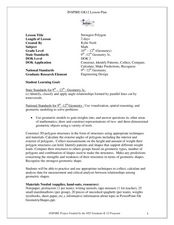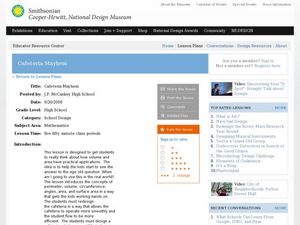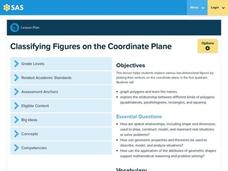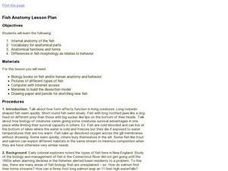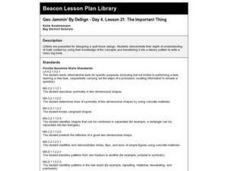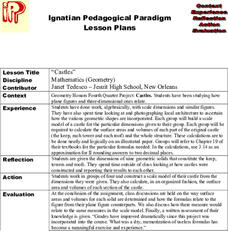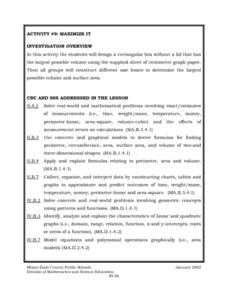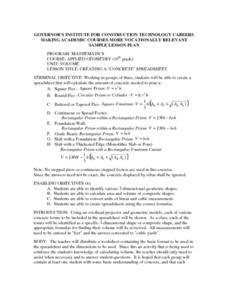Curated OER
Strongest Polygon
Students define and identify shapes by name. For this geometry lesson, students construct, identify and compare polygons based on the number of sides. They classify each shape based on their angle sum theorem.
Curated OER
Cafeteria Mayhem
Students design a cafeteria floor plan. In this area and perimeter lesson, groups create an efficient lunchroom layout on poster board by using geometric shapes and formulas as the basis for their designs. In the accompanying writing...
Curated OER
Does the Area of the Quadrilateral Change?
Seventh graders complete activities to further their understanding of area formulas. In this area instructional activity, 7th graders watch as the teacher uses Polystrips to model parallelograms. Students find the area of a rectangle and...
Curated OER
Inscribed Quadrilaterals and Parallelograms
Students differentiate between inscribed quadrilaterals and parallelograms. In this geometry lesson, students identify the shaped of the polygons when it is inscribed inside of a circle. They calculate the missing angles of the inscribed...
Pennsylvania Department of Education
Classifying Figures on the Coordinate Plane
Fifth graders use estimation to solve word problems. In this fractions lesson, 5th graders decide whether or not an answer to a work problem is reasonable by applying their knowledge of fractions, decimals and estimation. This lesson...
Curated OER
How Large is a Mole of M&M's
Students calculate whether or not a mole of M&M's fill their high school. They practice factor-labeling, define a mole, and calculate the number of cubic feet per mole of M&M's. To answer the question they measure and calculate...
Curated OER
Exploring Geometric Mean
Student identify the solution using geometric mean. In this geometry lesson plan, students create right triangles where the altitude of the triangle is the side containing the right angle. They modify shapes using Cabri software and...
Curated OER
Math Who Am I?
In this math facts review worksheet, students read the description of each math term and try to guess what the answer is. Students may check their attempts by circling the third letter in the box which gives the answer.
Curated OER
Fish Anatomy
Young scholars identify and interpret the internal anatomy of the fish. They also identify and define vocabulary for anatomical parts and anatomical functions and forms. Finally, students identify and interpret the differences in fish...
Curated OER
Geo Jammin By Design: The Important Thing
Students brainstorm what they know about geometric terms and patterns. They identify symmetry, shapes and congruency. They create a book of symmetry.
Curated OER
Math Who Am I?
In this math terms puzzle worksheet, students read the description for each math term. Students try to guess what each term is. Students circle the third letter in the box to check their answers.
Curated OER
Castles
Students create a scale model to a castle using the dimensions they were given. They calculate the surface areas and volumes of each section of their castle.
Curated OER
Maximize It!
Students design a rectangular box without a lid that has the largest possible volume using the supplied sheet of centimeter graph paper. They work in groups to construct different size boxes to determine the largest possible volume and...
Curated OER
Classification
Students explore the observable properties of matter and utilize them in classification. They use a binary classification system to divide objects, then justify their scheme.
Curated OER
Area Post Test
In this area learning exercise, students complete a ten question multiple choice test by finding the area of various geometric figures. This is an interactive learning exercise.
Curated OER
Geo Jammin' By Design - Day 7, Lesson 38: Kool Cups
Create geometric cups by interpreting directions, informational text, and mathematical concepts. Critical thinkers apply geometric theory (congruent shapes, patterns, symmetry) to actual directions to create a cup that holds Kool Aid....
Mathematics Assessment Project
Calculating Volumes of Compound Objects
After determining the volume of various drinking glasses , class members evaluate sample responses to the same task to identify errors in reasoning.
Cornell University
Bridge Building
Bridge the gaps in your knowledge of bridges. Individuals learn about bridge types by building models. The activity introduces beam bridges, arch bridges, truss bridges, and suspension bridges.
Curated OER
Perfectly Puzzling Pentominoes
Second graders utilize manipulatives (pentominoes) to demonstrate knowledge of: lines of symmetry, slides, reflections (flips), rotations (turns), area, and perimeter. This lesson plan gives students a meaningful way to practice these...
Curated OER
Introducing Topographic Maps: Guiding Students from Concrete Models to Graphic Representations
Young scholars interpret topographic maps and infer human activity as it is influenced by the landscape.
Curated OER
Volume of Rectangular Prism and Cylinder
Learners calculate volume of rectangular prisms and cylinders. They draw and label figures to use the formulas to calculate the volume of rectangular prisms. In addition, they use objects to calculate volume in a hands on activity.
Curated OER
Creating a "Concrete" Spreadsheet
Students create a spreadsheet that calculate the amount of concrete needed to pour various concrete forms.


